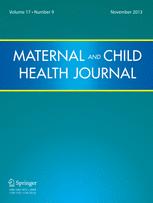Two recent publications from the MCH Life Course Research Network (LCRN)
October 29, 2013

|
- Lifecourse Health Development: Past, Present and Future
Neal Halfon, Kandyce Larson, Michael Lu, Ericka Tullis, Shirley Russ
http://link.springer.com/article/10.1007/s10995-013-1346-2
Abstract: During the latter half of the twentieth century, an explosion of research elucidated a growing number of causes of disease and contributors to health. Biopsychosocial models that accounted for the wide range of factors influencing health began to replace outmoded and overly simplified biomedical models of disease causation. More recently, models of lifecourse health development (LCHD) have synthesized research from biological, behavioral and social science disciplines, defined health development as a dynamic process that begins before conception and continues throughout the lifespan, and paved the way for the creation of novel strategies aimed at optimization of individual and population health trajectories. As rapid advances in epigenetics and biological systems research continue to inform and refine LCHD models, our healthcare delivery system has struggled to keep pace, and the gulf between knowledge and practice has widened. This paper attempts to chart the evolution of the LCHD framework, and illustrate its potential to transform how the MCH system addresses social, psychological, biological, and genetic influences on health, eliminates health disparities, reduces chronic illness, and contains healthcare costs. The LCHD approach can serve to highlight the foundational importance of MCH, moving it from the margins of national debate to the forefront of healthcare reform efforts. The paper concludes with suggestions for innovations that could accelerate the translation of health development principles into MCH practice.
- A Lifecourse Approach to Health Development: Implications for the Maternal and Child Health Research Agenda.
Shirley A. Russ, Kandyce Larson, Ericka Tullis, Neal Halfon
http://link.springer.com/article/10.1007/s10995-013-1284-z
Abstract: Lifecourse-informed models of health fundamentally challenge simple biomedical models, introducing new ways of thinking about how diseases develop. This paper considers the broad implications of lifecourse theory for the maternal and child health (MCH) research agenda. The Lifecourse Health Development model provides an organizing framework for a synthesis of the existing literature on lifecourse health and identification of gaps in knowledge. Priority areas identified for MCH research in order to close these knowledge gaps include: epigenetic mechanisms and their potential mutability; peri-conception as a critical and sensitive period for environmental exposures; maternal health prior to pregnancy; the role of the placenta as an important regulator of the intra-uterine environment; and ways to strengthen early mother-child interactions. Addressing knowledge gaps will require an emphasis on longitudinal rather than cross-sectional studies, long-term (lifetime) rather than short-term perspectives, datasets that include socio-demographic, biologic and genetic data on the same subjects rather than discipline-specific studies, measurement and study of positive health as well as disease states, and study of multi-rather than single generational cohorts. Adoption of a lifecourse-informed MCH research agenda requires a shift in focus from single cause-single disease epidemiologic inquiry to one that addresses multiple causes and outcomes. Investigators need additional training in effective interdisciplinary collaboration, advanced research methodology and higher-level statistical modeling. Advancing a life course health development research agenda in MCH will be foundational to the nation's long-term health.
Supported by cooperative agreement, UA6MC 19803 from HRSA/MCHB







